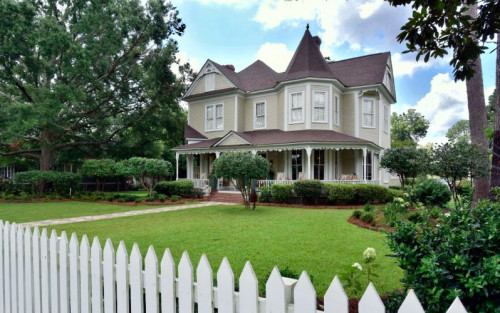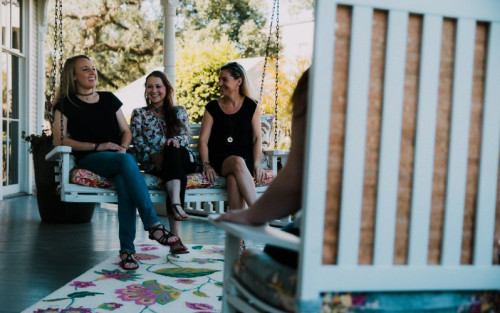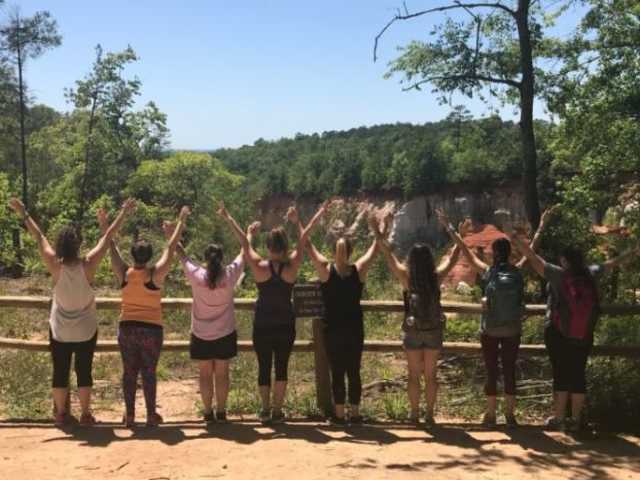






GraceWay Recovery
Verified Center
This provider's information has been quality-checked by Recovery.com's Research Team for accuracy and completeness, including center verification through appropriate third-party organizations.
Treatment Focus
This center primarily treats substance use disorders, helping you stabilize, create relapse-prevention plans, and connect to compassionate support.
Primary Level of Care
Offering intensive care with 24/7 monitoring, residential treatment is typically 30 days and can cover multiple levels of care. Length can range from 14 to 90 days typically.
Treatment Focus
This center primarily treats substance use disorders, helping you stabilize, create relapse-prevention plans, and connect to compassionate support.
Primary Level of Care
Offering intensive care with 24/7 monitoring, residential treatment is typically 30 days and can cover multiple levels of care. Length can range from 14 to 90 days typically.
Private Pay
You pay directly for treatment out of pocket. This approach can offer enhanced privacy and flexibility, without involving insurance. Exact costs vary based on program and length of stay. Contact the center for specific details.
GraceWay Recovery
GraceWay Recovery
About GraceWay Recovery
GraceWay Recovery Residence opened its doors in August 2003 with the mission of providing women with a long-term abstinence-based solution to addiction. Today, that mission continues to be realized on a daily basis.
Recover In A Welcoming Environment
GraceWay is located in a beautiful Victorian home in downtown Albany, Georgia. This setting provides a comfortable, warm environment for women to face the hardships of their past while receiving unconditional positive regard from their counselors. A structured schedule, including daily chores, exercise, mindfulness meditation, counselor-chaired groups, spirituality groups, in-house 12-step meetings, weekly individual sessions, daily living skills, and recreational activities, makes up the bones of GraceWay.
Support For Lasting Recovery
GraceWay’s intensive recovery support home has thirteen beds, is taken thirty days at a time, and is a 90 day program. Once women complete the program, they have the opportunity to transition into sober living at The Way Sober Living apartments. The fully furnished two bedroom apartments are next door to GraceWay. Women can better practice and hone their new recovery skills in one of our nine apartments at The Way Sober Living for a period of 90 days. Recovering women find universality and community at the apartments while continuing with 12-step meetings and aftercare groups.
Safe, Independent Sober Living
During sober living at The Way apartments, women also have two safe environments for employment: The Bread House & Granary and The Whittlesey House. Employment at either business fosters independence and self-sufficiency through money and time management. Working in an environment that’s free from temptation is a great stepping stone for recovering women to take into a world that may not be so safe. Through this aspect of sober living, women gain a greater confidence in their recovery and a sense of responsibility and financial comfort. All of these positive aspects combine to form a lasting feeling of empowerment and success, which are crucial during the recovery process. GraceWay also offers traveling intervention services, helping families gently place their loved ones into treatment.

Highlights from the Center
Highlights
These highlights are provided by and paid for by the center.
12-Step Approach
Women Only
19 Years in Business
Budget Friendly
Center Overview
Treatment Focus
This center primarily treats substance use disorders, helping you stabilize, create relapse-prevention plans, and connect to compassionate support.
Pricing and Program Length
Estimated Center Costs
The cost listed here ($5,000+), is an estimate of program cost. Center price can vary based on program and length of stay. Contact the center for more information. Recovery.com strives for price transparency so you can make an informed decision.
Meet Your Care Team

Debbie Mazur
Founder

Amy Jack
Program Director

Marianne Albert
Certified Peer Specialist

Tucker
GraceWay’s Recovery Dog




Levels of Care





Your Care Options
Specializations
Alcohol
Using alcohol as a coping mechanism, or drinking excessively throughout the week, signals an alcohol use disorder.
Cocaine
Cocaine is a stimulant with euphoric effects. Agitation, muscle ticks, psychosis, and heart issues are common symptoms of cocaine abuse.
Drug Addiction
Drug addiction is the excessive and repetitive use of substances, despite harmful consequences to a person's life, health, and relationships.
Life Skills
Teaching life skills like cooking, cleaning, clear communication, and even basic math provides a strong foundation for continued recovery.
Opioids
Opioids produce pain-relief and euphoria, which can lead to addiction. This class of drugs includes prescribed medication and the illegal drug heroin.
Who We Treat
Young Adults
Emerging adults ages 18-25 receive treatment catered to the unique challenges of early adulthood, like college, risky behaviors, and vocational struggles.
Midlife Adults
For adults ages 40+, treatment shifts to focus on the unique challenges, blocks, and risk factors of their age group, and unites peers in a similar community.
Pregnant Women
Addiction and mental health treatment meets the clinical and psychological needs of pregnant women, ensuring they receive optimal care in all areas.
Women only
Women attend treatment in a gender-specific facility, with treatment delivered in a safe, nourishing, and supportive environment for greater comfort.
Approaches
Evidence-Based
A combination of scientifically rooted therapies and treatments make up evidence-based care, defined by their measured and proven results.
Individual Treatment
Individual care meets the needs of each patient, using personalized treatment to provide them the most relevant care and greatest chance of success.
Twelve Step
Incorporating spirituality, community, and responsibility, 12-Step philosophies prioritize the guidance of a Higher Power and a continuation of 12-Step practices.
Therapies
1-on-1 Counseling
Patient and therapist meet 1-on-1 to work through difficult emotions and behavioral challenges in a personal, private setting.
Mindfulness Therapy
This ancient practice can be mental, emotional, and even spiritual. In meditation, you focus your attention on the present moment without judgement.
Art Therapy
Visual art invites patients to examine the emotions within their work, focusing on the process of creativity and its gentle therapeutic power.
Experiential Therapy
With this approach, patients heal by doing. Therapists help patients process difficult emotions to speak, using guided activities like art or dance.
Life Skills
Teaching life skills like cooking, cleaning, clear communication, and even basic math provides a strong foundation for continued recovery.
Relapse Prevention Counseling
Relapse prevention counselors teach patients to recognize the signs of relapse and reduce their risk.
Spiritual Care
Tending to spiritual health helps treatment become more effective, allowing patients to better cope with their emotions and rebuild their spiritual wellbeing.
Twelve Step Facilitation
12-Step groups offer a framework for addiction recovery. Members commit to a higher power, recognize their issues, and support each other in the healing process.
Conditions We Treat
Anger
Although anger itself isn't a disorder, it can get out of hand. If this feeling interferes with your relationships and daily functioning, treatment can help.
Codependency
Codependency is a pattern of emotional dependence and controlling behavior. It's most common among people with addicted loved ones.
Trauma
Some traumatic events are so disturbing that they cause long-term mental health problems. Those ongoing issues can also be referred to as "trauma."
Substances We Treat
Alcohol
Using alcohol as a coping mechanism, or drinking excessively throughout the week, signals an alcohol use disorder.
Benzodiazepines
Benzodiazepines are prescribed to treat anxiety and sleep issues. They are highly habit forming, and their abuse can cause mood changes and poor judgement.
Chronic Relapse
Consistent relapse occurs repeatedly, after partial recovery from addiction. This condition requires long-term treatment.
Cocaine
Cocaine is a stimulant with euphoric effects. Agitation, muscle ticks, psychosis, and heart issues are common symptoms of cocaine abuse.
Drug Addiction
Drug addiction is the excessive and repetitive use of substances, despite harmful consequences to a person's life, health, and relationships.
Ecstasy
Ecstasy is a stimulant that causes intense euphoria and heightened awareness. Abuse of this drug can trigger depression, insomnia, and memory problems.
Heroin
Heroin is a highly addictive and illegal opioid. It can cause insomnia, collapsed veins, heart issues, and additional mental health issues.
Methamphetamine
Methamphetamine, or meth, increases energy, agitation, and paranoia. Long-term use can result in severe physical and mental health issues.
Languages
Aftercare
Care Designed for Your Needs
Personal Amenities
Amenities
Special Considerations
Center Pets
Addiction and mental health facilities with pets allow patients to interact with friendly dogs, cats, horses, and in some cases, even dolphins.
Gender-specific groups
Patients in gender-specific groups gain the opportunity to discuss challenges unique to their gender in a comfortable, safe setting conducive to healing.
Activities
Off-Site Activities
Yoga
Yoga is both a physical and spiritual practice. It includes a flow of movement, breathing techniques, and meditation.
Off-Site Amenities
What people are saying
Treatment
4.7
Accommodations
4.6
Food & Nutrition
4.6
Value
4.7
Pros
- Excellent & Effective Treatment Programming (2)
- Confidential (2)
- Flexibility to Work (2)
- Straightforward Costs & Expectations (2)
M.E.
Treatment in 2017 • (14 months) • Reviewed 07/13/22
Former Client
•USA
ALJ
Reviewed 07/10/20
Review from Rehabs.com
Christine A.
Treatment in 2020 • (180+ days) • Reviewed 07/13/22
Former Client
•Radiology Tech
Liz P
Reviewed 07/10/20
Review from Rehabs.com
Rose Marie
Reviewed 09/14/20
Review from Rehabs.com





